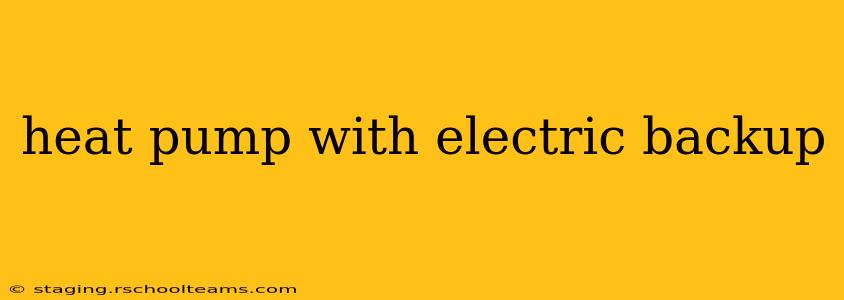Heat pumps are increasingly popular as an energy-efficient heating and cooling solution. However, in climates with extremely cold winters, a heat pump's efficiency can decrease. This is where an electric backup system comes in, ensuring consistent comfort even during the harshest weather. This guide explores the benefits, drawbacks, and considerations when choosing a heat pump with electric backup.
What is a Heat Pump with Electric Backup?
A heat pump with electric backup combines the energy-efficient heating and cooling capabilities of a heat pump with a supplementary electric heating element. The heat pump is the primary heating and cooling source. However, when the outdoor temperature drops below a certain point (typically around -5°C to -15°C, depending on the model), the electric backup kicks in to supplement the heat pump's output, maintaining a comfortable indoor temperature. This ensures reliable heating even in the coldest conditions where a heat pump alone may struggle.
How Does a Heat Pump with Electric Backup Work?
The system operates seamlessly. The heat pump continuously monitors the outdoor temperature and the indoor temperature set point. While the heat pump is the preferred method of heating and cooling, if the heat pump's output isn't sufficient to meet the heating demand, the electric backup system automatically engages, providing the additional heat needed. This transition is usually smooth and unnoticed by the homeowner.
What are the Advantages of a Heat Pump with Electric Backup?
- Reliable Heating in Cold Climates: This is the primary advantage. The electric backup eliminates the concern of insufficient heating during extreme cold snaps.
- Energy Efficiency (Most of the Time): Heat pumps are significantly more efficient than traditional electric resistance heating. The electric backup only operates when necessary, minimizing the use of less-efficient direct electric heating.
- Consistent Comfort: The combination system ensures consistent and comfortable indoor temperatures year-round, regardless of outdoor conditions.
- Reduced Reliance on Fossil Fuels: Heat pumps are environmentally friendly, significantly reducing carbon emissions compared to fossil fuel-based heating systems.
What are the Disadvantages of a Heat Pump with Electric Backup?
- Higher Initial Cost: The combined system is more expensive to install than a standard heat pump alone.
- Higher Electricity Bills (Potentially): While generally more energy-efficient than other systems, prolonged use of the electric backup during exceptionally cold periods can lead to higher electricity bills.
- Increased Complexity: The system is more complex than a simple heat pump, potentially requiring more specialized maintenance.
How Much Does a Heat Pump with Electric Backup Cost?
The cost varies significantly depending on factors such as the size of the system, the complexity of the installation, and regional labor costs. You should obtain multiple quotes from reputable HVAC contractors in your area to get an accurate estimate.
Is a Heat Pump with Electric Backup Right for My Home?
This depends on several factors:
- Climate: If you live in an area with extremely cold winters, a heat pump with electric backup is often a necessity to ensure reliable heating.
- Budget: Consider the higher initial cost and the potential for higher electricity bills during extreme cold periods.
- Energy Efficiency Goals: If you prioritize energy efficiency and environmental friendliness, this system is a good option, although the use of electric backup negates some of the pure heat pump efficiency benefits during cold snaps.
What are the Different Types of Electric Backup Systems?
Electric backup systems typically use electric resistance heating elements. The size and capacity of these elements vary depending on the system's design and the heating requirements of the home.
How Efficient is a Heat Pump with Electric Backup Compared to Other Heating Systems?
The overall efficiency depends heavily on the climate and the amount of time the electric backup is needed. Generally, heat pumps with electric backups are more efficient than traditional electric resistance heating systems, but less efficient than a heat pump alone on mild days.
This comprehensive guide provides a detailed overview of heat pumps with electric backup systems. Remember to consult with a qualified HVAC professional to determine the best heating and cooling solution for your specific needs and climate. They can assess your home's requirements and provide tailored recommendations.
